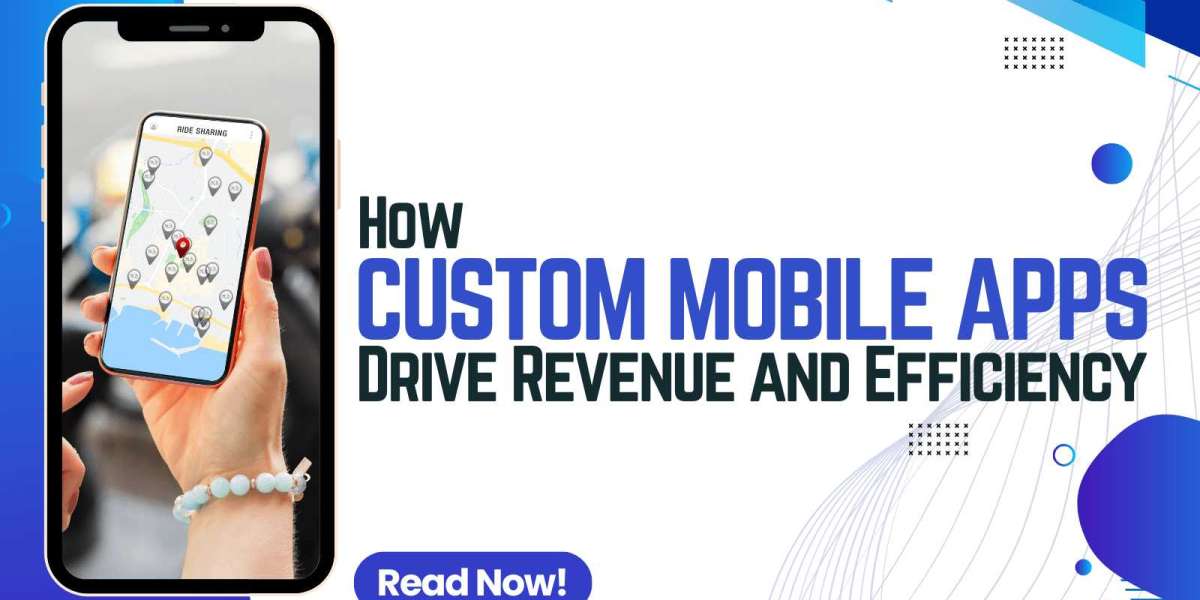In the dynamic landscape of modern business, mobile applications have emerged as indispensable tools for driving growth and enhancing efficiency. This article delves into the pivotal role of custom mobile apps in unlocking business potential, exploring how tailored solutions can propel revenue generation and operational excellence.
Understanding the Landscape of Mobile Application Development
The evolution of mobile applications has been remarkable, transitioning from basic utilities to sophisticated platforms powering diverse industries. Today, businesses witness a surge in demand for mobile app development solutions, driven by the proliferation of smartphones and evolving consumer preferences. Amidst this surge, custom mobile apps stand out, offering tailored functionalities to meet specific business objectives and user needs.
The Benefits of Custom Mobile App Development Solutions
Custom mobile apps offer a myriad of advantages over off-the-shelf solutions, notably in terms of user experience, efficiency, and competitive edge. By aligning features with unique business requirements, these apps enhance user satisfaction, streamline operations, and differentiate brands in crowded marketplaces. Moreover, they empower businesses to adapt swiftly to changing market dynamics and capitalize on emerging opportunities.
Enhanced User Experience: At the core of custom mobile apps lies a commitment to delivering unparalleled user experiences. Unlike generic applications, custom solutions are designed with meticulous attention to user interface (UI) and user experience (UX) principles, ensuring intuitive navigation and seamless interactions. By prioritizing user-centric design, businesses can foster deeper connections with their target audience, driving engagement and loyalty.
Improved Efficiency and Productivity: One of the primary motivations behind investing in custom mobile apps is to optimize internal processes and boost productivity. These apps can automate repetitive tasks, streamline workflows, and facilitate real-time collaboration among team members, thereby maximizing operational efficiency. From inventory management to customer relationship management (CRM), custom solutions offer tailored functionalities tailored to specific business needs, eliminating inefficiencies and accelerating decision-making.
Tailored Features to Meet Specific Business Needs: Unlike off-the-shelf alternatives, custom mobile apps are built from the ground up to address the unique challenges and opportunities facing each business. Whether it's integrating proprietary systems, implementing advanced analytics, or incorporating industry-specific functionalities, these apps can be tailored to exact specifications, aligning seamlessly with existing workflows and business objectives. This bespoke approach ensures that businesses derive maximum value from their investment in mobile technology, driving measurable outcomes and sustainable growth.
Competitive Advantage: In today's fiercely competitive landscape, differentiation is key to sustaining success. Custom mobile apps provide businesses with a distinct competitive advantage by offering unique features and functionalities that set them apart from rivals. Whether it's personalized recommendations, gamified experiences, or location-based services, these apps enable businesses to create memorable interactions that resonate with their target audience, driving customer acquisition and retention in the process.
How Custom Mobile Apps Drive Revenue
Beyond enhancing operational efficiency and user engagement, custom mobile apps serve as potent revenue drivers for businesses across various sectors. By monetizing digital assets, facilitating transactions, and fostering brand loyalty, these apps unlock diverse revenue streams while maximizing profitability and long-term sustainability.
Direct Revenue Streams: One of the most direct ways custom mobile apps contribute to revenue generation is through in-app purchases, subscriptions, or premium features. By offering users exclusive content or value-added services, businesses can monetize their apps directly, diversifying revenue streams and mitigating dependency on traditional revenue channels. Additionally, in-app advertising presents another lucrative opportunity for businesses to capitalize on user engagement and generate passive income.
Increased Customer Engagement and Retention: Custom mobile apps play a pivotal role in nurturing customer relationships and fostering brand loyalty. Through personalized experiences, targeted promotions, and loyalty programs, businesses can engage users more effectively, encouraging repeat interactions and driving customer lifetime value. By leveraging push notifications, in-app messaging, and social media integration, these apps keep users informed and engaged, strengthening their emotional connection with the brand and reducing churn rates in the process.
Cost Savings and Operational Efficiency: While the initial investment in custom mobile app development may seem daunting, the long-term benefits far outweigh the costs. By streamlining operations, reducing manual errors, and optimizing resource allocation, these apps deliver significant cost savings over time, enhancing the bottom line and enabling businesses to reinvest in growth initiatives. Moreover, by centralizing data and insights, custom apps empower decision-makers with actionable intelligence, enabling them to make informed strategic decisions that drive revenue and profitability.
Opportunities for Monetization: In addition to direct revenue streams, custom mobile apps offer various opportunities for indirect monetization, ranging from data monetization to affiliate marketing. By leveraging user-generated content, behavioral insights, and contextual advertising, businesses can unlock new revenue streams while enhancing the overall user experience. Furthermore, by integrating with third-party platforms and ecosystems, these apps can tap into additional revenue sources, such as referral commissions, affiliate partnerships, and revenue-sharing agreements.
Key Considerations When Choosing a Mobile Application Development Company
Selecting the right mobile application development company is crucial to the success of any custom app project. With numerous options available in the market, businesses must evaluate potential partners based on their experience, expertise, and ability to deliver tailored solutions that align with their unique requirements.
Experience and Expertise: When evaluating mobile application development companies, experience and expertise should be top priorities. Look for vendors with a proven track record of delivering successful projects in your industry or niche. Assess their portfolio, client testimonials, and case studies to gauge their capabilities and ascertain whether they have the requisite skills and resources to execute your project effectively.
Portfolio and Client Testimonials: A mobile application development company's portfolio speaks volumes about its capabilities and proficiency. Look for companies that have developed a diverse range of apps across various platforms and industries. Pay attention to the quality of their work, user reviews, and ratings on app stores to gauge customer satisfaction and overall performance. Additionally, seek out client testimonials and references to get a firsthand account of their experience working with the company.
Customization Capabilities: Customization is paramount when it comes to developing bespoke mobile apps that meet your specific business needs and objectives. Evaluate the company's ability to tailor solutions to your exact requirements, including design, functionality, and scalability. Discuss your vision and expectations upfront to ensure alignment and avoid any misunderstandings down the line. A mobile application development company that understands your business goals and is willing to go the extra mile to accommodate your needs is worth investing in.
Development Process and Communication: Transparent communication and a well-defined development process are essential for the successful execution of any mobile app project. Inquire about the company's approach to project management, communication channels, and milestones tracking. Ensure that they follow industry best practices and methodologies, such as Agile or Scrum, to ensure timely delivery and minimize risks. Establish clear lines of communication and set expectations regarding project timelines, deliverables, and feedback loops to foster collaboration and accountability.
Post-Launch Support and Maintenance: Launching a mobile app is just the beginning of the journey. Continuous support and maintenance are critical to ensuring its long-term success and performance. Inquire about the company's post-launch support services, including bug fixes, updates, and feature enhancements. Discuss service level agreements (SLAs), response times, and escalation procedures to ensure prompt resolution of any issues that may arise. A mobile application development company that stands behind its work and is committed to providing ongoing support is invaluable for the success of your app.
Case Studies: Success Stories of Custom Mobile App Development
To illustrate the transformative power of custom mobile apps, let's explore some real-world success stories of businesses that have leveraged tailored solutions to drive growth, innovation, and customer satisfaction.
Streamlining Operations with a Tailored App: A leading retailer, faced challenges in managing inventory, tracking sales, and analyzing customer data across multiple stores. They partnered with a mobile application development company to develop a custom app that integrated with their existing systems and provided real-time insights into sales performance, inventory levels, and customer preferences. The app streamlined order fulfillment, optimized inventory management, and personalized the shopping experience for customers, resulting in increased sales and customer satisfaction.
Driving Sales through Personalized User Experiences: A digital marketplace, that wanted to enhance user engagement and drive sales by delivering personalized recommendations and offers to its customers. They collaborated with a mobile application development company to build a custom app that leveraged machine learning algorithms to analyze user behavior and preferences. The app delivered personalized product recommendations, promotions, and discounts based on individual interests and purchase history, resulting in higher conversion rates and increased revenue for the company.
Achieving Competitive Edge with Innovative Features: A healthcare provider, sought to differentiate itself in a crowded market by offering innovative telemedicine services to its patients. They engaged a mobile application development company to create a custom app that enabled patients to schedule virtual appointments, consult with doctors remotely, and access medical records securely. The app also incorporated features such as medication reminders, symptom tracking, and health monitoring tools, enhancing the overall patient experience and positioning the company as a leader in telehealth services.
Strategies for Maximizing the Impact of Custom Mobile Apps
While custom mobile apps offer significant advantages over off-the-shelf solutions, maximizing their impact requires careful planning, execution, and continuous iteration. Here are some strategies to help businesses leverage the full potential of their custom apps and achieve their growth objectives.
Continuous Iteration and Improvement: The key to success in the fast-paced world of mobile app development is continuous iteration and improvement. After launching your app, gather feedback from users, analyze performance metrics, and iterate on features and functionalities based on insights gleaned from real-world usage. By embracing a data-driven approach and prioritizing user feedback, businesses can fine-tune their apps to meet evolving customer needs and preferences, ensuring long-term relevance and competitiveness.
Integration with Existing Systems and Platforms: To maximize efficiency and streamline operations, it's essential to integrate custom mobile apps with existing systems, platforms, and data sources. Whether it's syncing with ERP systems, CRM software, or third-party APIs, seamless integration ensures smooth data flow and eliminates silos, enabling real-time insights and informed decision-making. Moreover, by leveraging existing infrastructure and investments, businesses can accelerate time-to-market and minimize development costs, maximizing ROI in the process.
User Feedback and Analytics-Driven Enhancements: User feedback and analytics play a crucial role in shaping the evolution of custom mobile apps. Encourage users to provide feedback through in-app surveys, ratings, and reviews, and leverage analytics tools to track user behavior, engagement metrics, and conversion rates. Use these insights to identify pain points, uncover opportunities for improvement, and prioritize feature enhancements that align with user needs and business objectives. By iteratively refining the app based on user feedback and data-driven insights, businesses can deliver a superior user experience and drive sustainable growth.
Challenges and Solutions in Custom Mobile App Development
While custom mobile apps offer immense potential for driving revenue and efficiency, they also present unique challenges and complexities that businesses must navigate effectively. From budget constraints to technical complexity, security concerns, and scalability issues, here are some common challenges associated with custom mobile app development and strategies to overcome them.
Budget Constraints: One of the most significant challenges businesses face when embarking on a custom mobile app development project is budget constraints. Building a high-quality app that meets business requirements and user expectations requires a significant investment of time, resources, and expertise. To mitigate budgetary risks, businesses should prioritize features and functionalities based on their value proposition and return on investment (ROI), opting for a phased approach to development that allows for incremental enhancements over time. Additionally, exploring alternative funding options such as venture capital, crowdfunding, or strategic partnerships can help offset development costs and accelerate time-to-market.
Technical Complexity: Custom mobile app development is inherently complex, requiring a diverse set of technical skills, tools, and frameworks to bring a project to fruition. From choosing the right programming languages and development platforms to architecting scalable and secure solutions, businesses must navigate a myriad of technical challenges throughout the development lifecycle. To overcome technical complexity, it's essential to collaborate with experienced developers and engineers who possess the requisite expertise and domain knowledge. Adopting best practices such as modular design, test-driven development (TDD), and continuous integration (CI) can help mitigate risks and ensure the quality and reliability of the final product.
Security Concerns: Security is paramount in the realm of custom mobile app development, given the sensitive nature of the data and transactions handled by these applications. From protecting user privacy and safeguarding personal information to defending against cyber threats and data breaches, businesses must implement robust security measures to mitigate risks and ensure compliance with regulatory requirements. This includes encrypting data in transit and at rest, implementing multi-factor authentication, and conducting regular security audits and penetration testing. By prioritizing security from the outset and adhering to industry best practices, businesses can build trust with their users and protect their brand reputation from potential security incidents.
Scalability and Future-Proofing: Scalability is a critical consideration in custom mobile app development, especially for businesses aiming for rapid growth and expansion. As user demand grows and the app's user base scales, it's essential to ensure that the underlying infrastructure and architecture can support increasing loads and accommodate future enhancements. This requires careful planning and design upfront, with a focus on building modular, scalable, and flexible solutions that can adapt to evolving business requirements and technological advancements. By leveraging cloud computing, microservices architecture, and containerization, businesses can future-proof their apps and position themselves for long-term success in a rapidly evolving digital landscape.
Conclusion
Custom mobile apps have emerged as indispensable tools for driving business growth, enhancing efficiency, and fostering innovation in today's digital economy. By harnessing the power of tailored solutions, businesses can unlock new revenue streams, optimize operations, and differentiate themselves in competitive markets. However, realizing the full potential of custom mobile apps requires careful planning, execution, and continuous iteration. By partnering with the right mobile app development company and adopting best practices in design, development, and deployment, businesses can capitalize on the transformative power of mobile technology and achieve sustainable growth in the digital age. As the mobile landscape continues to evolve, businesses must stay agile and adaptive, leveraging custom mobile apps as strategic assets to propel their growth and success in an increasingly connected world.


